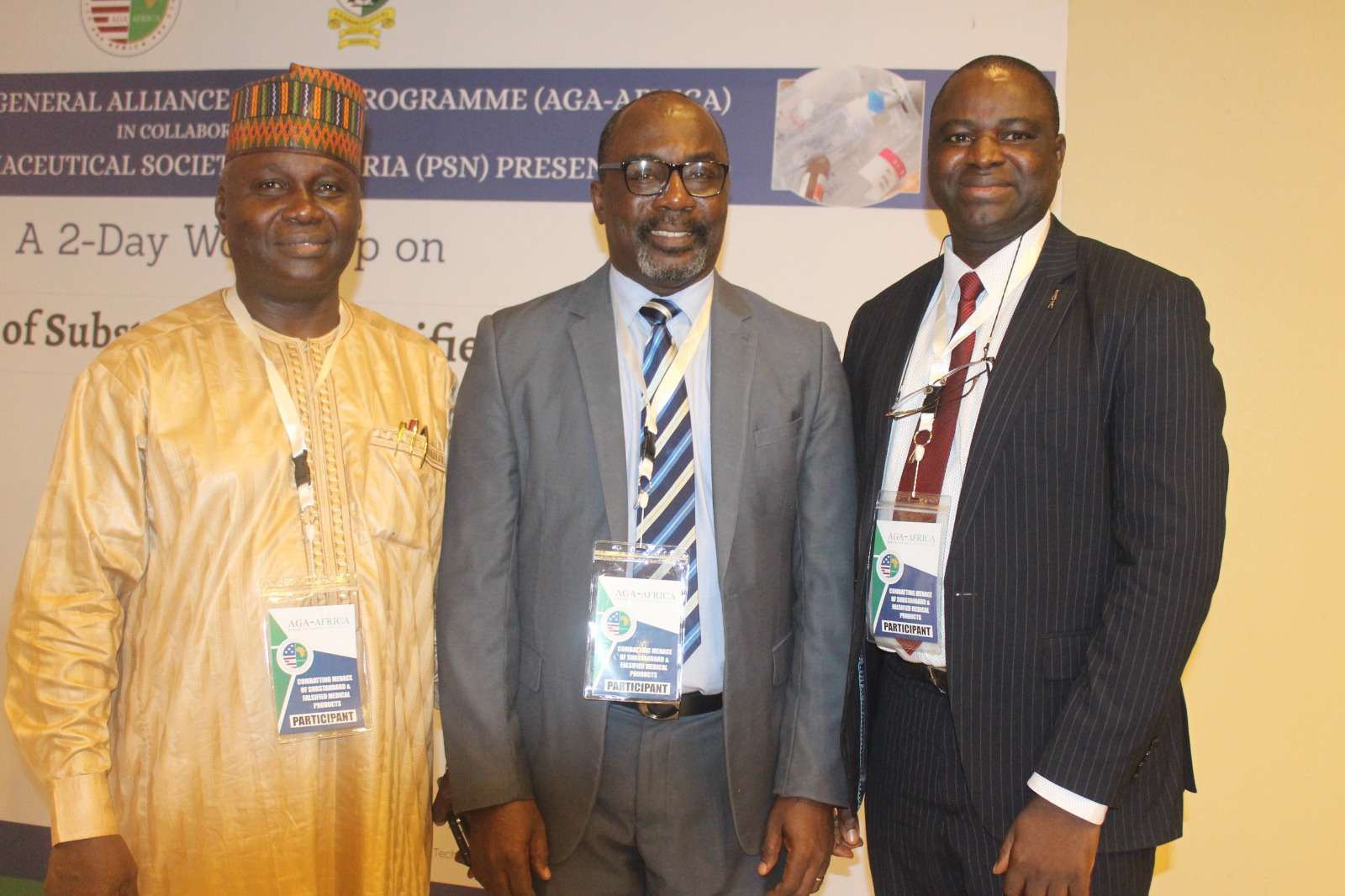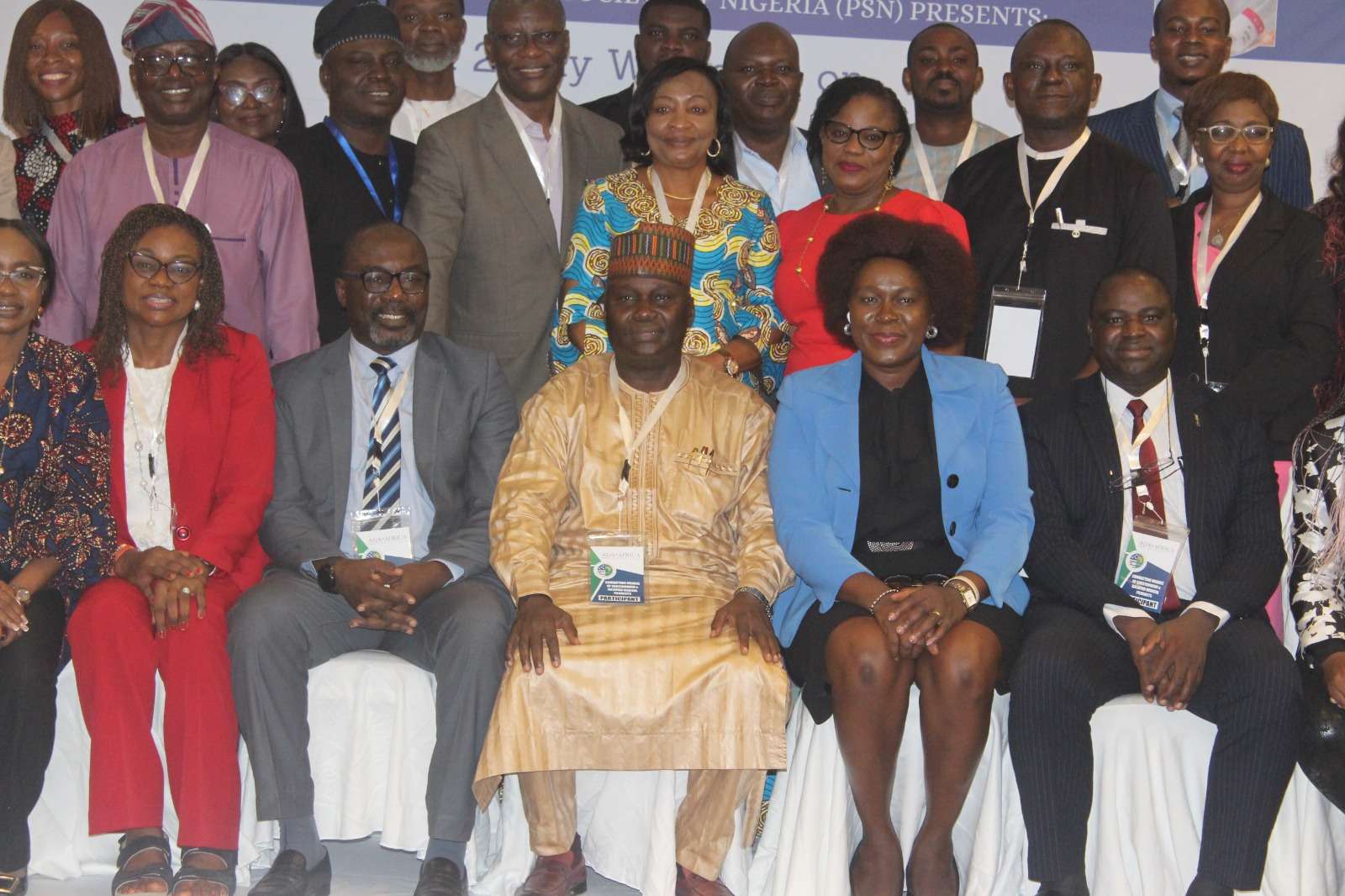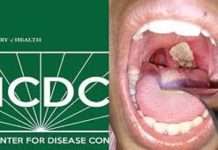
In what can be described as a timely and highly significant convergence of eggheads and policymakers in the pharmaceutical industry in Africa, the Pharmaceutical Society of Nigeria (PSN), in collaboration with the Attorney General Alliance-Africa Programme (AGA-Africa), has rolled out strategies for safeguarding the pharmaceutical landscape in Nigeria and beyond from the nefarious activities of drug counterfeiters.
Speaking during a 2-day workshop on combating the menace of substandard and falsified medical products, held at Sheraton Hotel, Lagos, from Tuesday 25 April to Wednesday 26 April, 2023, President of the apex pharmaceutical body in Nigeria, Professor Cyril Usifoh, lauded the partnership between the PSN and AGA-Africa, while bemoaning the level of damage substandard and falsified medical products have unleashed on patients all over the world.
According to Usifoh, substandard and falsified medical products have been responsible for the deaths of over 280 million children all over the world – a development he described as absolutely unacceptable. He therefore urged pharmacists to rise to the occasion and play their roles as direct stakeholders in ensuring the safety of medicines.
While urging the government to provide the enabling incentives for stakeholders such as NAFDAC to sustain the culture of vigilance and responsiveness which it has been known for, Usifoh applauded the food and drug regulator for its efforts so far, especially in facilitating the approval of the malaria vaccine for use in Nigeria.
“Poverty and greed are some of the factors responsible for the production of substandard and falsified medical products in Africa, especially in Nigeria. Government needs to intervene urgently,” he said.

Speaking on the topic: “A review of the regulatory framework for control of substandard medical products”, Director General of the National Agency for Food and Drug Administration and Control (NAFDAC), Professor Mojisola Adeyeye, represented by Pharm. Fraden Bitrus, head of Post-surveillance Marketing of the agency, enumerated the dangers inherent in substandard and falsified medical products and also outlined measures that can help tackle the menace.
Conceding to the fact that substandard and fake medical products have been responsible for serious health issues and death, due to their failure to treat the ailments they are purported to treat, Adeyeye said NAFDAC’s approach has always been three-pronged – prevent, detect and respond. Even though she admitted the daunting nature of the fight against drug counterfeiters, she was optimistic that the efforts of her agency have been yielding the desired results, adding that there was room for improvement.
Professor Adeyeye identified poor remuneration, lack of personnel to track cross-border trafficking, backlog of litigations in the complex legal system of Nigeria as some of the impediments against effective drug counterfeiting tracking and control. She however, recommended the improvement of information sharing amongst stakeholders, capacity building, more inter-agency collaborations, good distribution monitoring, the dismantling of the open drug market and increase in advocacy efforts.
On his part, Registrar of the Pharmacy Council of Nigeria (PCN), Pharm. Babashehu Ahmed, said the fight against substandard medical product remains key to every regulator, especially in the African region with its peculiarities. Every regulator needs to wake up and do the right thing by ensuring that the activities of drug counterfeiters are curtailed, no matter their status in society. He cited prolonged litigation bottlenecks as some of the factors responsible for slow pace of success in combating the criminals. He however expressed optimism that the tide would eventually turn against the drug counterfeiters.
“There was a time we had multiple court cases in many locations in Nigeria with some of those cases spanning up to ten years. The slow response of our judiciary to drug counterfeiting cases does not help us as a regulator. However, we thank God that the trend is fast changing for the better”, he said.
National Chairman of the Association of Community Pharmacists of Nigeria (ACPN), Pharm. Adewale Oladigbolu, while speaking on the burden of substandard and falsified medical products, lamented the hydra-headed implications of such products on public health in Africa, with special focus on Nigeria. He also observed that factors such as quackery, chaotic drug distribution network, poor implementation of existing drug laws, inefficient collaboration among stakeholders and illegal importations constitute an obstacle to medicine safety on the continent and in Nigeria, in particular.
For the Head of Regulatory Compliance, South African Health Products Regulatory Authority (SAHPRA), Daphney Fafudi, there is the need for stakeholders to approach the fight against substandard and falsified medical products from a multi-dimensional perspective. She highlighted the importance of the following: monitoring of imports, monitoring of the quality of medical products throughout the supply chain for prevention, detection and response to substandard and falsified medical products and the control of promotional, marketing and advertising activities, including education and awareness through the media.
While acknowledging the presence of drug counterfeiters in Ghana, Acting Head of the Legal Services Department, Food and Drugs Authority (FDA) Ghana, William Korbla Agbavitor, added that his country would continue to learn from Nigeria in terms of strategies to combat substandard and falsified medical products. He added that Ghana records minimal litigations, mostly because drug manufacturers are scared of falling into the net of the nation’s FDA which has almost zero tolerance for drug counterfeiting as well as very stringent punitive measures.
In her presentation on the role of technology in the fight against substandard and falsified medical products, HOD of the Department of Pharmaceutics and Pharmaceutical Technology, University of Lagos, Dr Margaret Ilomuanya, urged stakeholders to consider the imperative and urgent need to develop the appropriate and effective technologies that would help detect substandard and falsified medical products.
“As criminals are becoming more sophisticated in their approach to drug counterfeiting, we must brace up with the right technology to contain such sophistication,” she observed.










